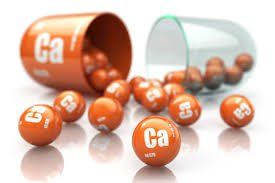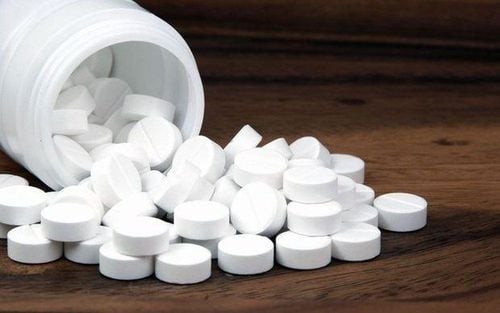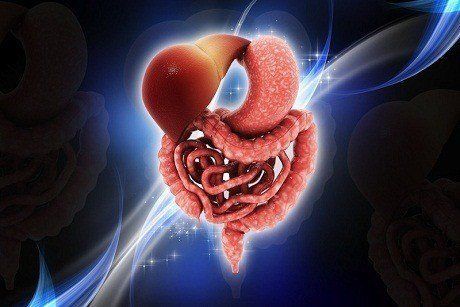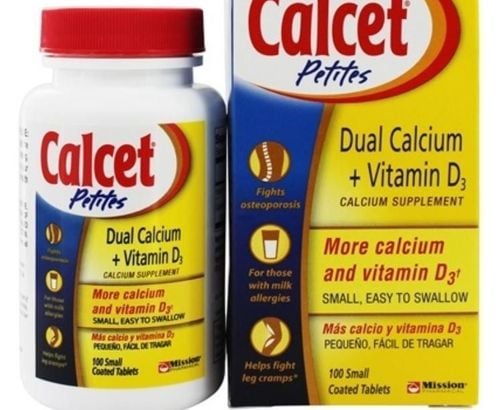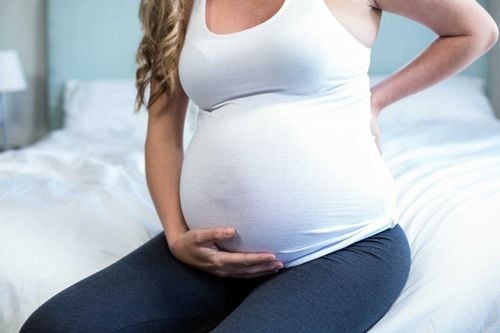This is an automatically translated article.
Antibiotics are used to treat bacterial infections. However, sometimes antibiotic treatment can lead to an unpleasant side effect of digestive upset. The digestive system of children is immature and sensitive, so it is easily affected by this.1. Why do children take antibiotics with digestive disorders? Digestive disorders are a common problem in daily life, especially in children when their digestive system is immature and sensitive. This is not a very dangerous situation, but if left too long, it will cause many serious consequences.
Children with digestive disorders will cause poor digestion of food, causing flatulence, bloating, anorexia, poor absorption, stunting, growth retardation, which can affect intelligence and emotions children in the future.
Each person's intestinal tract contains beneficial bacteria and harmful bacteria. Normally, these bacteria live together peacefully to create a balanced microflora (85% good bacteria and 15% bad bacteria) to help keep the gut healthy. However, this can change dramatically when a person starts treatment with antibiotics. Antibiotics have bactericidal or bacteriostatic effects depending on the mechanism of action of each drug. Once in the body, antibiotics will kill all types of bacteria that share certain characteristics, regardless of whether it is beneficial or harmful bacteria.
When beneficial bacteria are destroyed, the benefits related to food digestion, absorption, immunity, or digestive stability are reduced or lost. From there, it causes digestive disorders with typical symptoms such as diarrhea, constipation, flatulence, abdominal distension, raw stools, etc.
2. Do children take antibiotics to have bowel movements? Antibiotics are used to treat bacterial infections. However, sometimes antibiotic treatment can lead to an unpleasant side effect: diarrhea. Antibiotic-associated diarrhea is quite common. It is estimated that 5 to 25% of adults may experience diarrhea while taking antibiotics. Children taking antibiotics have a higher risk of having a bowel movement, because the digestive system of children is more immature than adults
Not all bacteria are bad. There are many types of good bacteria that live in your gut. These good bacteria help with digestion, and they also play a role in keeping you healthy. Antibiotics can disrupt the balance of these bacteria. One of the side effects of killing beneficial bacteria is its ability to make stools looser.
Another role played by good bacteria is to control the growth of opportunistic bacteria. Opportunistic bacteria such as Clostridium difficile (C. diff) can cause infections if they are left unchecked, which can happen if the good bacteria are killed off by antibiotics. Toxins produced by C. diff can cause inflammation of the intestines, leading to diarrhea.

Một số trẻ có thể gặp tình trạng đi ngoài sau khi sử dụng kháng sinh
3. Symptoms of antibiotic-associated diarrhea Antibiotic-associated diarrhea is defined as passing loose, watery stools three or more times per day while on antibiotics. This can appear about a week after starting antibiotics. In addition, diarrhea may also develop for several weeks after finishing antibiotic treatment.
If you are infected with C. diff , you may experience other symptoms such as:
Abdominal pain or cramps Fever Decreased appetite Nausea 4. Certain antibiotics are more likely to cause diarrhea Wear Although all antibiotics can cause diarrhea, some are more closely related to the condition. Until now, we still don't understand exactly why these antibiotics are more likely to cause diarrhea than others.
Antibiotics that are more likely to cause diarrhea include:
Penicillins such as ampicillin and amoxicillin Cephalosporins such as cephalexin and cefpodoxime Clindamycin 5. What foods to eat to treat diarrhea when using antibiotics born? If your child is experiencing diarrhea due to repeated antibiotics, dietary modifications can help ease his or her symptoms. Some general suggestions include:
Eat low-fiber foods: although high-fiber foods are recommended when you're healthy, eating them when you have diarrhea can make the condition worse . Potassium supplements: This nutrient can be lost due to diarrhea, eating foods containing potassium may help. Replenish lost fluids and salts: Diarrhea can cause you to lose fluids and electrolytes faster, so it's important to replenish these. Foods and drinks after a child has diarrhea include:
Liquids including water, decaffeinated drinks or teas. Fruit like bananas, apple sauce, or a small amount of canned fruit. Grains such as white rice, white bread, and noodles. Peeled potatoes (good sources of potassium) that have been boiled or baked. Protein sources like poultry, lean meat and fish Yogurt contains beneficial bacteria.

Cha mẹ nên bổ sung chất lỏng cho trẻ khi trẻ bị sốt
6. Foods to avoid during antibiotic-associated diarrhea Certain foods can worsen diarrhea symptoms or interfere with antibiotic treatment, including:
Beverages alcoholic Drinks that contain caffeine, such as coffee, soft drinks, and tea Dairy products (other than yogurt), can cause digestive problems when taking antibiotics and affect antibiotic absorption. Fatty foods such as fatty meats, pies, chips and other fried foods. Foods or drinks that are high in added sugars such as sodas, juices, cakes and cookies High-fiber foods like whole grains, legumes, and most fruits and vegetables. Spicy foods can further irritate your digestive tract. Also, try to avoid eating grapefruit or taking calcium supplements. These can both affect how your body absorbs the antibiotic, and can decrease its effectiveness.
7. Self-care measures for antibiotic-associated diarrhea In addition to adjusting your diet, you can take other steps to help your child ease diarrhea symptoms while on medication. antibiotic.
Replenish lost fluids: diarrhea can lead to dehydration. Stay hydrated by drinking plenty of water. Low-sugar soups or juices can also help prevent dehydration. You might consider an oral rehydration solution like Oresol . Use anti-diarrheal medications with caution: in some cases, anti-diarrheal medications such as loperamide (Imodium) can be effective in reducing a child's symptoms. However, talk to your doctor before using these medications. Because in some cases, the use of anti-diarrheal drugs can slow down the time the body takes to eliminate toxins in the digestive tract. This will prolong the child's condition and put him at risk for other complications. 8. Children taking antibiotics have diarrhea, when to see a doctor? Contact your doctor or go to an urgent care facility, if your child is taking antibiotics and has the following symptoms:
Diarrhea more than 5 times in a day There is blood or pus in the child's stool. Fever Abdominal pain or cramps. If your child's diarrhea is milder, your doctor may suggest that you stop giving your child antibiotics until the diarrhea stops, or prescribe another antibiotic that has a lower risk of causing diarrhea.
In cases where C. diff infection is suspected, the doctor will prescribe antibiotics that target C. diff bacteria, such as vancomycin, fidaxomicin, metronidazole.
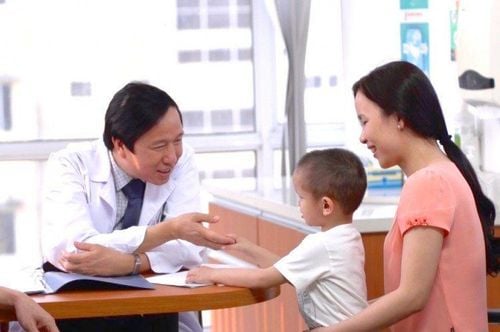
Khi trẻ tiêu chảy trên 5 lần/ngày, cha mẹ nên đưa trẻ đến gặp bác sĩ
9. Are there ways to prevent diarrhea while taking antibiotics?
There are a few things you can do to reduce the risk of your child getting antibiotic-associated diarrhea.
Try Probiotics: Probiotics can help replenish good bacteria back into your child's digestive system. The scientific literature has found that taking probiotics while taking antibiotics can be effective for preventing diarrhea. Practice good hygiene: Frequent hand washing, especially after using the bathroom, can help prevent the spread of C. diff bacteria. Follow dosing instructions: some antibiotics can be given with food. Be sure to let your child do this to help prevent digestive irritation. Take antibiotics only when needed: although antibiotics can treat bacterial infections, they are not effective against viral infections such as colds and flu. Overuse of antibiotics can negatively affect a child's digestion and cause other problems. Talk to your doctor if your child has had diarrhea while taking antibiotics before. Your doctor may prescribe an antibiotic that is less likely to cause this problem. Parents should be very careful about the case of a child taking antibiotics with diarrhea, if this condition persists, the doctor can change the antibiotic being used and give water to the child when necessary to avoid affecting health. .
Currently, Pediatrics - Vinmec International General Hospital always receives and treats common problems in children such as: diarrhea, respiratory, intestinal... The examination is always done according to the correct procedure. by doctors, experts with many years of experience.
The fact that children are treated early and in a quality medical environment will bring high efficiency, shorten the hospital stay and ensure the best health for the child.
Please dial HOTLINE for more information or register for an appointment HERE. Download MyVinmec app to make appointments faster and to manage your bookings easily.
Reference source: webmd.com - healthline.com




